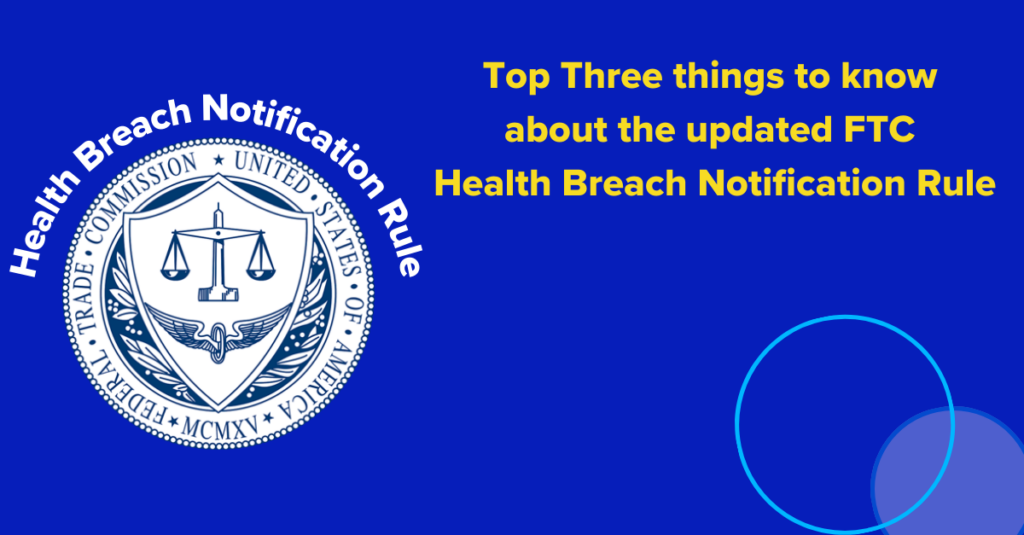The Federal Trade Commission (FTC) recently updated its Health Breach Notification Rule to address the evolving landscape of digital health applications and connected devices. This update is particularly significant as it strengthens protections for users’ sensitive health data, ensuring that breaches are promptly reported and managed to mitigate potential harm. In this blog we’ll highlight some of the top things to know about the update as well as what it means for businesses with BYOD workforces.
The rule’s significance lies in its broadened scope and stricter provisions, which now include requirements for notifying both users and the FTC in the event of a data breach. This is critical as the proliferation of health apps and connected devices has vastly increased the amount of sensitive health data that can be compromised. The new rule underscores the FTC’s commitment to safeguarding consumer privacy and enhancing data security in the health tech sector.
Here are the top three things to know about the new FTC Health Breach Notification Rule:
- Expanded Scope and Coverage:
The updated rule broadens its scope to include a wider range of entities that handle health information. This includes not only traditional healthcare providers but also health apps, connected devices, and any other entities that handle consumer health data. This expansion is significant as it ensures comprehensive coverage and protection of health information in the digital age - Stricter Notification Requirements:
The rule mandates that entities must notify affected individuals, the FTC, and in some cases, the media, promptly after discovering a data breach. The notification must include specific details about the breach, the type of information involved, and steps individuals can take to protect themselves. These stringent requirements aim to enhance transparency and enable consumers to take timely action to mitigate potential harm - Enhanced Penalties for Non-Compliance:
The updated rule introduces more severe penalties for entities that fail to comply with the notification requirements. This includes significant fines and other legal repercussions. The heightened penalties underscore the FTC’s commitment to enforcing data protection and ensuring that entities handling sensitive health information adhere to strict security standards
Understanding these key aspects of the updated FTC Health Breach Notification Rule is crucial for entities handling health data, as it ensures they can comply effectively and protect consumer information.
Remote work, which has become more prevalent since the pandemic, presents unique challenges to maintaining data security and compliance with the FTC’s updated rule. Employees accessing sensitive information from various locations and devices increases the risk of data breaches. Ensuring secure access and handling of health data in a remote work environment requires robust cybersecurity measures and comprehensive employee training on data protection practices
Here are the top three things to know about the updated FTC Health Breach Notification Rule as it relates to remote work:
- Increased Risk of Data Breaches:
Remote work environments inherently present higher risks of data breaches due to the dispersed nature of accessing sensitive information. Employees working from various locations and devices can lead to weaker security controls compared to centralized office environments. The FTC’s updated rule highlights the importance of securing all endpoints and communication channels to protect health data from unauthorized access and breaches. - Enhanced Security and Compliance Requirements:
Companies must implement robust cybersecurity measures to comply with the updated rule. This includes ensuring that remote work systems and tools are secure, such as using encrypted connections (VPNs), strong authentication methods, and regular security audits. Businesses need to adopt comprehensive data protection strategies that cover remote work scenarios to meet the FTC’s stringent notification and data protection requirements. - Mandatory Employee Training and Awareness:
With the new rule, it is crucial for companies to provide ongoing training and awareness programs for their remote workforce. Employees need to understand the importance of data protection, how to recognize and report potential breaches, and the specific protocols to follow when handling sensitive health information remotely. This training helps ensure that employees are vigilant and knowledgeable about the latest security practices and compliance obligations
How can Venn help play a role in each of these?
Venn Software can play a role in all three by offering a BYOD workforce solution for remote workers that ensure employees can access sensitive health data securely, regardless of their location. By using Venn’s Secure Enclave technology, businesses can create isolated, protected environments for handling sensitive information. It ensures that health information is accessed and managed within a secure framework, reducing the risk of breaches.
Venn’s comprehensive security measures include data encryption, secure access controls, and real-time monitoring, which align with the FTC’s enhanced requirements and help businesses maintain compliance while protecting consumer data.
Venn Software aids in the employee training and awareness aspect by integrating user-friendly security features. Venn makes it easier for employees to follow security protocols, thereby enhancing overall data security in a remote work setting.
In conclusion, the updated FTC Health Breach Notification Rule represents a critical step forward in protecting health data in our increasingly digital world. While it introduces new challenges, particularly in the context of remote work, companies can effectively navigate these challenges with the right security measures and strategies. Venn’s Secure Enclave provides a robust framework to help businesses ensure compliance and protect sensitive health information.



